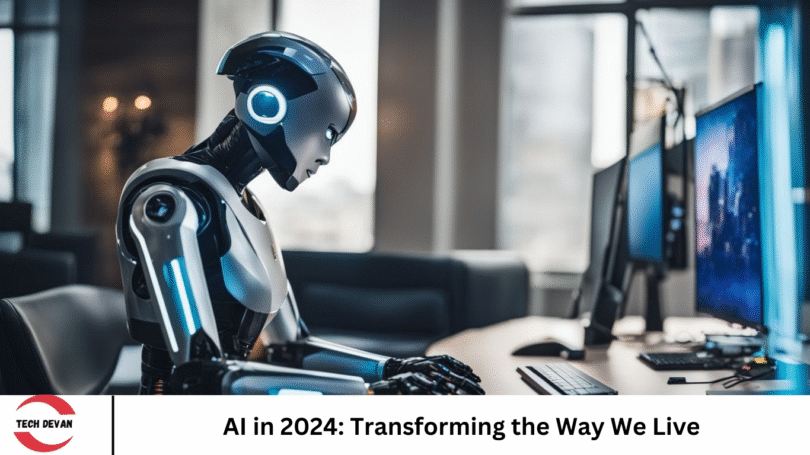Artificial intelligence (AI) has transitioned from an emerging technology to a transformative force reshaping nearly every aspect of our daily lives. In 2024, the influence of AI is more pervasive than ever, affecting everything from the way we work and communicate to how we receive healthcare and make purchases.
This article explores the multifaceted impact of AI in 2024, highlighting key trends, applications, and implications for individuals, businesses, and society at large.
AI in the Workplace
AI is revolutionizing the modern workplace in 2024. With the help of intelligent automation, businesses are streamlining operations, increasing productivity, and enhancing decision-making. Machine learning algorithms analyze vast datasets to uncover insights that were once hidden, helping leaders make informed, strategic decisions.
Key Trends:
- AI-powered productivity tools like chatbots, smart scheduling assistants, and automated transcription services are freeing employees from repetitive tasks.
- Predictive analytics is being used to forecast trends, customer behavior, and market dynamics, offering businesses a competitive edge.
- Remote collaboration is more efficient, with AI facilitating language translation, real-time transcription, and virtual presence technologies.
AI in Healthcare
In 2024, AI continues to redefine healthcare delivery. From diagnostics to patient care, AI systems are enhancing precision, reducing costs, and improving patient outcomes.
Key Applications:
- Diagnostic imaging tools powered by AI detect conditions such as cancer, cardiovascular disease, and neurological disorders with high accuracy.
- Predictive modeling helps identify at-risk patients before symptoms emerge, enabling preventative care.
- AI-driven virtual health assistants offer 24/7 support, helping patients manage chronic conditions and adhere to treatment plans.
These technologies are making healthcare more personalized, efficient, and accessible, particularly in underserved regions.
AI in Education
Education in 2024 is undergoing a paradigm shift thanks to AI. Personalized learning platforms adapt to each student’s strengths and weaknesses, offering customized content and pacing.
Highlights:
- Intelligent tutoring systems provide real-time feedback and tailored instruction.
- Automated grading and assessment tools reduce the workload on educators.
- Language processing tools assist students with disabilities or those learning new languages.
AI also plays a key role in administrative functions, such as enrollment forecasting and curriculum planning, improving overall institutional efficiency.
AI in Smart Homes and Daily Living
AI has become an integral part of our homes, making daily living more convenient and efficient. Smart home devices powered by AI learn user habits to optimize comfort, security, and energy use.
Key Innovations:
- Voice-activated assistants like Alexa and Google Assistant handle tasks from setting reminders to controlling smart appliances.
- AI-powered security systems use facial recognition and behavior analysis to enhance home safety.
- Energy management systems adjust lighting, heating, and cooling based on occupancy patterns and weather forecasts.
These advancements contribute to a higher quality of life, reducing stress and freeing up time for more meaningful activities.
AI in Retail and Consumer Experience
Retail is one of the industries most visibly transformed by AI in 2024. Companies leverage AI to deliver personalized shopping experiences, streamline logistics, and enhance customer service.
Impact Areas:
- Recommendation engines suggest products based on browsing and purchase history.
- AI chatbots provide instant support, improving customer satisfaction.
- Inventory management systems use predictive analytics to minimize stockouts and overstock situations.
In e-commerce, visual search and augmented reality powered by AI help consumers make more informed purchasing decisions, bridging the gap between online and in-store shopping experiences.
AI in Transportation
The transportation sector has embraced AI to enhance safety, efficiency, and sustainability. In 2024, self-driving technology, predictive maintenance, and intelligent traffic systems are becoming mainstream.
Notable Developments:
- Autonomous vehicles are being tested and deployed in urban environments for ride-sharing and delivery services.
- AI-based traffic management reduces congestion and optimizes traffic flow.
- Fleet management systems use AI to monitor vehicle health and route efficiency.
These innovations promise not only reduced travel time but also lower emissions and safer roads.
Ethical and Societal Considerations
As AI becomes more embedded in our lives, ethical and societal concerns are growing. In 2024, discussions around data privacy, algorithmic bias, and job displacement are at the forefront.
Key Issues:
- Data privacy regulations are evolving to keep up with AI’s capabilities, ensuring user consent and data security.
- Bias in AI algorithms is being addressed through diverse training data and transparent model development.
- Reskilling initiatives are essential to help workers adapt to the AI-driven economy.
Public trust in AI systems depends on responsible development and deployment, requiring collaboration among technologists, policymakers, and civil society.
Future Outlook
Looking ahead, the role of AI will only expand. Innovations in quantum computing, natural language understanding, and robotics will open new frontiers for AI applications.
Emerging Trends:
- AI-human collaboration in creative fields like art, music, and literature.
- AI in environmental monitoring to combat climate change and promote sustainability.
- Advancements in general AI that bring machines closer to human-like reasoning and adaptability.
While the future is not without challenges, the potential benefits of AI far outweigh the risks when managed responsibly.
Frequently Asked Question
How is AI being used in everyday life in 2024?
AI is integrated into daily routines through smart assistants, personalized content recommendations, AI-powered healthcare tools, smart home devices, and more—making tasks easier, faster, and more efficient.
What are the biggest changes AI has brought to the workplace in 2024?
AI has automated repetitive tasks, enhanced decision-making through data analytics, improved collaboration with real-time translation tools, and increased productivity with intelligent scheduling and project management tools.
Is AI improving healthcare outcomes in 2024?
Yes, AI is significantly improving healthcare by enabling faster and more accurate diagnoses, providing predictive insights for preventative care, and offering virtual health assistants for chronic disease management.
How does AI personalize education in 2024?
AI customizes learning experiences through adaptive learning platforms, intelligent tutoring systems, and automated feedback—helping students progress at their own pace and enhancing educational outcomes.
Are smart homes safer and more efficient because of AI in 2024?
Absolutely. AI-powered home systems optimize energy usage, enhance security through facial recognition and smart surveillance, and offer voice-activated control over lighting, climate, and appliances.
What ethical concerns surround AI in 2024?
Key concerns include data privacy, algorithmic bias, and job displacement. Ongoing discussions focus on regulation, ethical development, and ensuring AI is used responsibly and equitably.
What’s the future of AI beyond 2024?
Future developments may include stronger AI-human collaboration in creative industries, AI applications in environmental sustainability, and progress toward general AI with more advanced reasoning and adaptability.
Conclusion
AI is more than a technological trend; it is a transformative force reshaping every aspect of how we live, work, and interact. From personalized healthcare and smart homes to AI-enhanced workplaces and ethical concerns, the reach of artificial intelligence is vast and growing. Embracing this change with awareness and responsibility will be crucial in ensuring that AI continues to serve humanity positively. As we move forward, staying informed and engaged will help individuals and organizations harness AI’s full potential, paving the way for a smarter, more connected future.






Leave a Comment